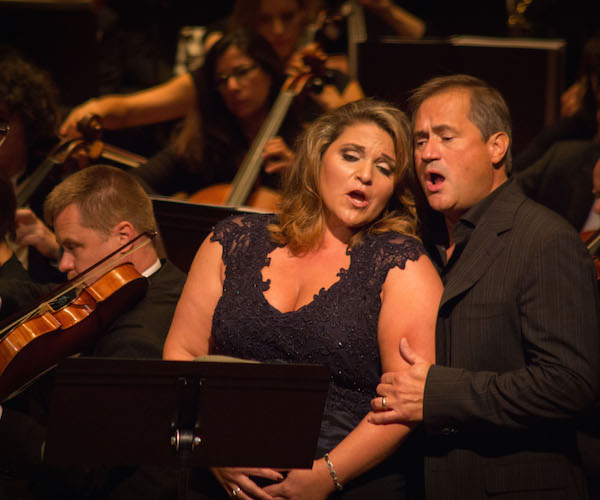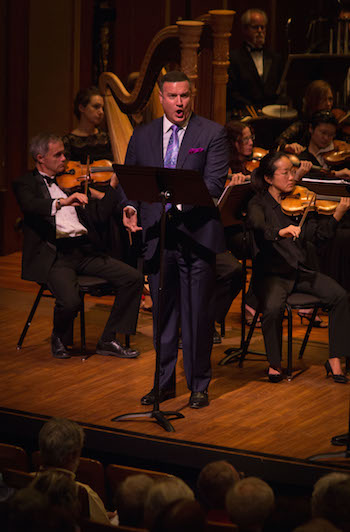Concert Review: Odyssey Opera’s “Le Cid” — Romantic Turbulence
Massenet’s instinct for drama and gifts as an orchestrator go a long way to carrying the piece but, even when played as incisively and enthusiastically as it was by Odyssey’s combined forces, it still can make for a long night at the theater.

Tamara Mancini and Paul Groves performing in Odyssey Opera’s staging of “Le Cid.” Photo: Courtesy of Odyssey Opera.
By Jonathan Blumhofer
It’s perhaps safe to say that no one ever accused Jules Massenet of being among the most original of 19th-century theatrical composers. At least that’s one of the takeaways from Le Cid, Massenet’s 1885 hit, which received a rare Boston performance courtesy of Odyssey Opera on Friday night at Boston’s Jordan Hall. No, Massenet wasn’t an operatic pioneer. But he was an accomplished composer for the stage who knew what was in his bag of tricks and just when to use them.
Le Cid is nothing if not a numbers opera – the “numbers” here being all the conventions that can make Romantic opera so utterly engaging and unforgettable. Love triangle? Check. Female lead placed in an impossible situation? Done. The hero’s fate determined – or, rather, put off – at the last second by pressing outside circumstances? It’s in here. Colorful, ear-catching music for the orchestra that celebrates exotic musical locales? And how. Dramatic scenes for all the major leading roles, including bravura displays for the hero and heroine? Done and done. Le Cid possesses all these used (and overused) techniques and then some. It’s not too much to say that there’s nothing in the opera that isn’t already in operas by Berlioz, Gounod, Bizet, Verdi, Wagner, or – especially – Meyerbeer (whose presence is strongly echoed in the closing martial music in Act 4), but all that might be beside the point.
Where it really comes to life is in the handful of passages on which Massenet put his distinctive stamp. Like the moment in Act 1 that’s pure magic: after the elderly Don Diègue has convinced his son, Rodrigue, to duel with Count Gormas (who has just offended Diègue’s honor), Rodrigue’s love interest (and Gormas’ daughter), Chimène, appears to sing a brief phrase. She’s accompanied, prominently, by tremolandi strings and harps, the texture an intimation of the purity and otherworldliness of love that stands as a marked contrast to the vengeful music (and mood) that surrounds it. He follows this up in Act 2 with an orchestrational stroke of which Berlioz, no doubt, would have approved: an ominous, rumbling bass drum accompanying the unaccompanied chorus’ lament for the deceased Gormas.
These type gestures dot Le Cid. If only the whole opera were so consistently inspired. On the whole, Le Cid lacks enough distinctive tunes, primarily memorable arias and choruses, and a libretto that really justifies its near-four-hour duration (counting one intermission and a pair of short breaks). That said, Massenet’s instinct for drama and gifts as an orchestrator go a long way to carrying the piece, but, even when played as incisively and enthusiastically as it was by Odyssey’s combined forces, it still can make for a long night at the theater.
The plot is drawn from Pierre Corneille’s play that tells of the 11th-century Spanish hero, here named Rodrigue, who, to preserve his elderly father’s honor, duels and kills the father of his beloved, Chimène. She demands vengeance from the King, who almost relents but postpones Rodrigue’s fate when news arrives of the approach of the Moorish army. Rodrigue leads the Spanish to victory, after which Chimène is torn between her love for Rodrigue and desire for revenge. Ultimately, she chooses the former, but only after Rodrigue declares that he will take his own life is she can’t decide whether she loves him or wants him dead.
As is usually the case, Odyssey’s casting was strong, though both of Friday night’s leads left something to be desired in their performances.
In the title role, Paul Groves seemed to be having an off night. Over the first half of the opera, especially, Groves’ voice sounded a bit strained and, in its highest range, rather fuzzy. He rallied over the evening’s second half – his appearances in Acts 3 and 4 were particularly heroic and compelling – but the overall impression that he left was a bit vague. Still, his big aria, “O souvrain,” and his Act 3 duet with Chimène gave glimpses of the clarion charisma of which he’s capable.
As Chimène, Tamara Mancini brought impressive stamina and mighty tone to the role. She was at her best in the opera’s most heavily dramatic moments, namely those in which Chimène’s conflicting emotions explode into impassioned rage or heartbreak. Her “Mort! mort! Qui l’a frappe” in Act 2 smoldered with violent intensity and “Pleurez, mes yeux” in Act 4 sang with true pathos and deep feeling.
What I missed in her performance, though, was the sense of vulnerability and intimacy that her character, from time to time, demands. Part of the problem seemed to be technical: her vibrato tended to get in the way, especially in quieter sections. But interpretively, too, she seemed to have a more intuitive grasp of the opera’s most extreme moments and sang them accordingly. It was, in the end, a rather one-sided realization of the role that, while at times thrilling, didn’t mine as far below the surface of the music as it could have.
Eleni Calenos proved charming as L’Infante, the King’s daughter who harbors her own attraction to Rodrigue: she sang the part beautifully, clear and bright-toned. The character is a bit of a throwaway – her feelings for Rodrigue are never fully explored and the potential for rivalry between L’Infante and Chimène left untapped – but Calenos played her about as sincerely and winningly as anyone could.

Michael Chioldi performing in Odyssey Opera’s “Le Cid.” Photo: Courtesy of Odyssey Opera.
As Don Fernand, the indecisive and rather oblivious King of Castile, Michael Chioldi sang with regal tone and vocal power to spare. His stentorian bass gave the illusion of anchoring the turbulent emotional action unfolding around his character, even as the King actually drove it, vacillating on making important decisions and ignoring (and offending) important ministers, thus setting in motion Le Cid’s dramatic trajectory. And it’s a shame that Massenet’s libretto killed off the offended Count Gormas relatively early on, especially since Kristopher Irmiter realized the part with such richness and energy on Friday.
Oren Gradus certainly didn’t look the part of the opera’s old man, Don Diègue, though he imbued the role with a dose of world-weariness that was compelling. Robert Honeysucker’s brief appearance as the apparition of Sainte Jacques was steeped in nobility, and David Salisbury Fry and Ethan Bremner ably filled out the opera’s other small roles.
The Odyssey Opera Chorus, which had a fairly prominent role commenting on the action, sang splendidly. They brought power and bite when called for (the men, in particular, acquitted themselves mightily in the encampment scene in Act 3, arguably the opera’s best), and warmth and solemnity to other points.
One of the quirks of 19th-century French opera is the extensive use of ballet. Le Cid features a series of extended sequences, mostly inspired by traditional Spanish dance forms. The most substantial of these falls during Act 2, though there’s also a significant one in Act 3. In practice, these scenes tend to hold up the action of the opera, though on Friday they at least provided ample opportunity for the fantastic Odyssey Opera Orchestra to strut its stuff.
And preen it did. I’ve praised this ensemble to the rafters from its inception and there’s little I could add here without becoming redundant. Suffice it to say, the orchestra played with crisp energy and lots of character. This is music that’s filled with striking timbres and instrumental combinations: Massenet scored the piece with terrific care and purpose. On Friday, its orchestrational details – led by principal flute Sarah Brady, principal oboe Jennifer Slowik, concertmaster Grace Park, principal cello David Russell, and harpists Ina Zdorovetchi and Franziska Huhn – simply glowed.
Overall, too, I thought that, of Odyssey’s three Jordan Hall fall productions (Le Cid, Rienzi, and Die tote Stadt), Le Cid fit the orchestra and the performance space best. The instruments and voices were, on the whole, perfectly balanced: nothing was too big or loud, no soloists were covered, and there was never a sense that the ears were being assaulted. Conductor Gil Rose paced the opera’s many climaxes well and kept things flowing both smoothly and, considering the amount of music to get through, rather briskly.
Alas, to these ears, at least, Le Cid made less of an impression than did last September’s Die tote Stadt, though my sense is that that had more to do with its musical shortcomings than with Friday’s performance. In the latter category, Odyssey remains the gold standard for professional opera in Boston.
Jonathan Blumhofer is a composer and violist who has been active in the greater Boston area since 2004. His music has received numerous awards and been performed by various ensembles, including the American Composers Orchestra, Kiev Philharmonic, Camerata Chicago, Xanthos Ensemble, and Juventas New Music Group. Since receiving his doctorate from Boston University in 2010, Jon has taught at Clark University, Worcester Polytechnic Institute, and online for the University of Phoenix, in addition to writing music criticism for the Worcester Telegram & Gazette.
Tagged: Gil-Rose, Jules Massenet, Le Cid, Odyssey Opera, Paul Groves, romantic opera
